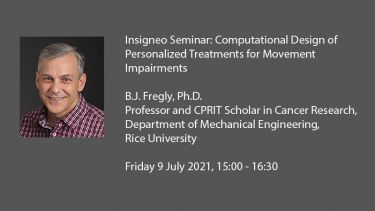Insigneo Seminar: Computational Design of Personalized Treatments for Movement Impairments

Event details
Description
We are delighted to announce that B.J. Fregly, Professor and CPRIT Scholar in Cancer Research from the Department of Mechanical Engineering at Rice University will give our next Insigneo Seminar on Friday 9 July at 15:00 on ‘Computational Design of Personalized Treatments for Movement Impairments’. This event will take place online (Insigneo Members please check your calendar invitations for joining details) to request an invitation please contact info@insigneo.org.
Abstract:
Movement impairments caused by orthopedic and neurologic conditions affect roughly 15% of the U.S. adult population and often lead to an increased risk of serious health conditions (e.g., heart disease, diabetes, high blood pressure, obesity) and a decreased quality of life. Neurorehabilitation and surgical interventions for movement impairments are typically designed using a “one size fits all” approach informed by subjective clinical experience. However, for many clinical situations (e.g., stroke neurorehabiliation, orthopedic cancer surgery), each patient is highly unique, creating the need for personalized interventions informed by objective data so as to maximize each patient’s functional outcome.
This seminar will discuss how the Rice Computational Neuromechanics Lab is seeking to use patient-specific neuromusculoskeletal models to design novel and effective personalized treatments for movement impairments. After motivating the potential value of model-based personalized treatment design, the seminar will provide an historical perspective on the lab’s efforts to make this vision a reality. For past efforts, I will discuss computational design of a modified gait pattern to unload the medial compartment of the knee in an individual with medial knee osteoarthritis. For present efforts, I will discuss expansion and evaluation of our computational modeling process with a sample application involving computational design of a FastFES treatment protocol to improve paretic propulsion in an individual post-stroke. For future efforts, I will discuss how patient-specific muscle synergy information could be used to personalize stroke neuro-rehabilitation interventions and predict the functional outcome of pelvic sarcoma surgery.
Biography:
B.J. Fregly, Ph.D.
Professor and CPRIT Scholar in Cancer Research
Department of Mechanical Engineering
Rice University
B.J. Fregly received his Bachelor’s degree from Princeton University (1986) and his Masters and Ph.D. degrees from Stanford University (1987 and 1993) in Mechanical Engineering. Following a year of post-doctoral research in France at the University of Lyon (1993-1994), Dr. Fregly worked as a software developer in Silicon Valley for Rasna/Parametric Technology Corporation (1995-1999). From 1999 to 2017, he served on the faculty of the Department of Mechanical & Aerospace Engineering at the University of Florida, where he was a Knox T. Millsaps Professor, a University of Florida Research Foundation Professor, and the recipient of department and college Teacher of the Year awards. In August of 2017, Dr. Fregly joined the Department of Mechanical Engineering at Rice University as a Professor and CPRIT Scholar in Cancer Research. His research focuses on modeling, simulation, and optimization of the human neuromusculoskeletal system with the goal of designing highly effective personalized treatments for movement impairments. To date, the three primary clinical application areas have been stroke, osteoarthritis, and pelvic cancer. Dr. Fregly has been the PI on over $11 million in research funding in the United States from the National Science Foundation (including a CAREER Award), the National Institutes of Health, the National Aeronautics and Space Administration, and most recently the Cancer Prevention Research Institute of Texas.

